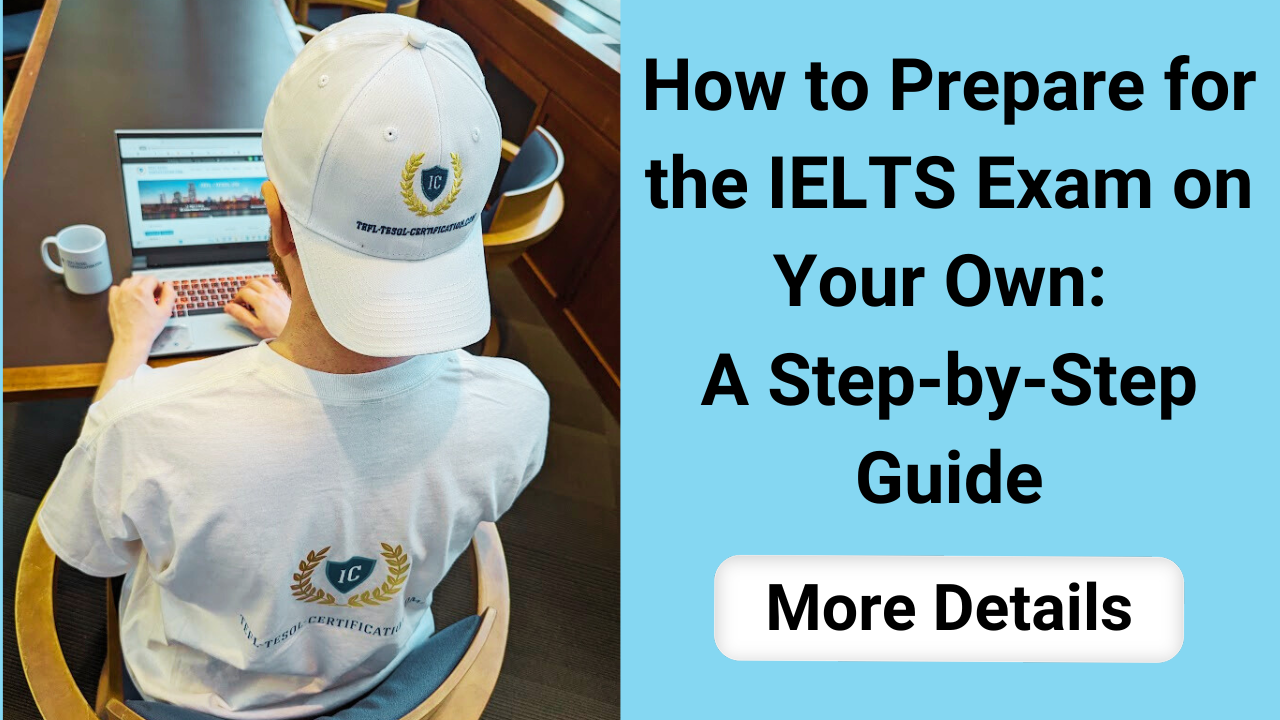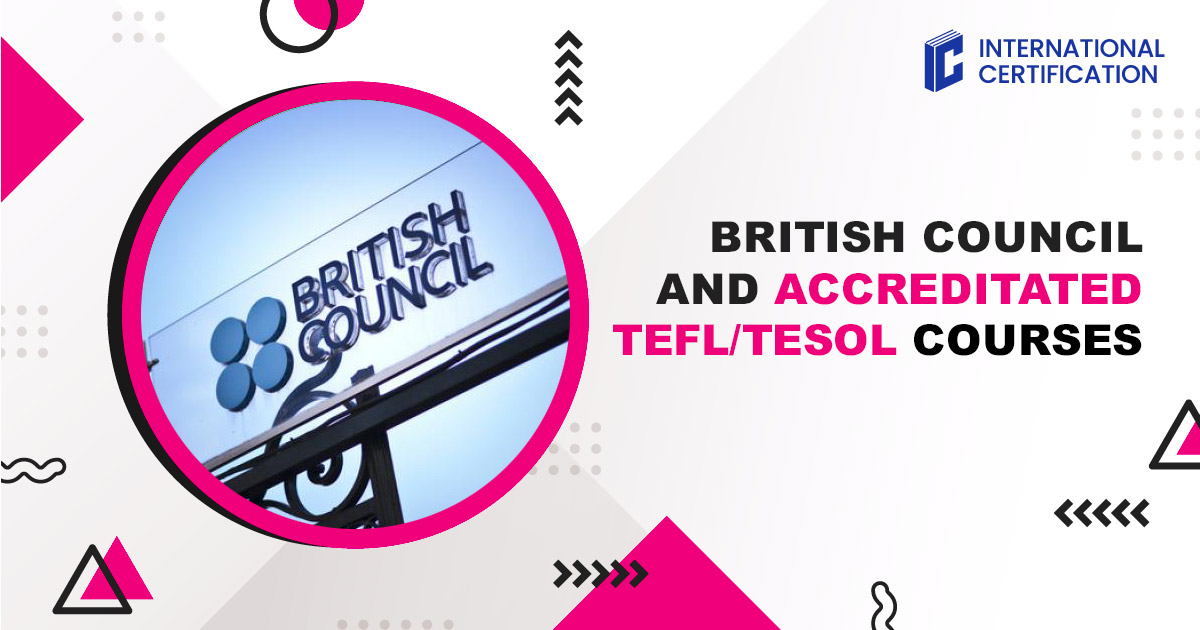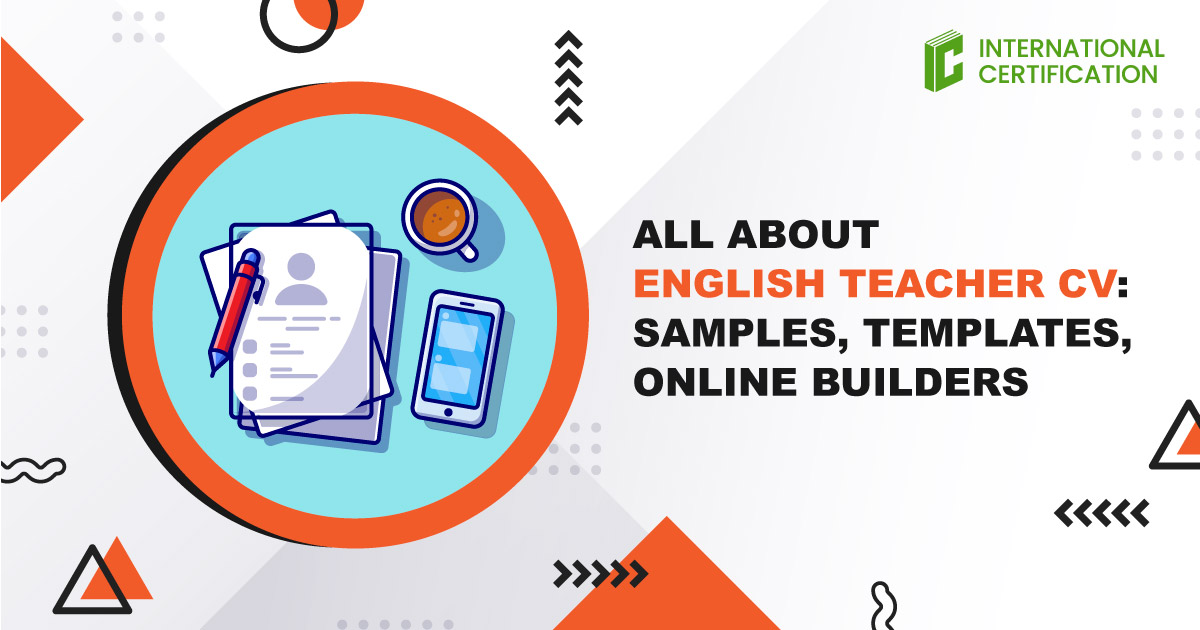And start earning money 💸 by teaching English in your own country, abroad, or online from anywhere on the planet! 🎁 Gifts and bonuses: professional support from your personal coach 🧑🏫 and job placement assistant 💼.
Table of contents
- How to Prepare for the IELTS Exam on Your Own: A Step-by-Step Guide
- Quick Overview of IELTS
- IELTS Test Format and Sections
- Why Study for IELTS on Your Own?
- Where to Begin with IELTS Preparation?
- How Much Time is Needed to Prepare for IELTS?
- Sample Weekly IELTS Study Plan
- Best Resources for Self-Preparing for IELTS
- Section-by-Section IELTS Preparation
- Common Mistakes in IELTS Self-Preparation
- Conclusion
How to Prepare for the IELTS Exam on Your Own: A Step-by-Step Guide
IELTS is an international English language exam, and the idea of taking it often causes anxiety among candidates. Many wonder: is it possible to prepare for IELTS on your own, or is a teacher absolutely necessary? I once asked myself the same thing. 😊 The truth is, self-preparation for IELTS is not only possible but can also be highly effective — with the right strategy and discipline.
In this guide, I’ll share a step-by-step study plan, useful resources, and personal tips that will help you achieve a high IELTS score. You’ll learn how to structure your learning process, what to focus on in each section of the exam, and how to avoid common mistakes. Ready to start? Let’s go! 🚀
Quick Overview of IELTS
IELTS (International English Language Testing System) is a global exam designed to assess the English Prociency of non-native speakers. IELTS certification is often required for university admissions abroad, immigration to countries like Canada, the UK, and Australia, or for employment overseas. There are two versions of the test: Academic (for education) and General Training (for immigration and work).
Each candidate receives a score from 1 to 9 in 0.5 increments. The higher the score, the better the candidate's command of the language. IELTS evaluates four core skills: reading, listening, writing, and speaking.
IELTS Test Format and Sections
Before creating a study plan, it’s important to understand the structure of the test. IELTS includes four sections, each testing a different skill. Here’s a summary:
| Section | Duration | Content |
|---|---|---|
| Listening | ≈ 30 minutes | 4 recordings, 40 questions |
| Reading | 60 minutes | 3 passages, 40 questions |
| Writing | 60 minutes | 2 tasks: essay and letter/graph description |
| Speaking | 11–14 minutes | 3-part interview |
📌 Note: Task 1 in Writing differs between Academic and General Training (graph vs. letter), but the test structure is largely the same.
💡 Unlock the secrets to doubling your teaching income with our exclusive checklist! 🎯 This checklist is designed for English teachers who want to 📈 attract more students and 🔥 keep them engaged for the long term.
Why Study for IELTS on Your Own?
IELTS courses and tutoring can be expensive and time-consuming. Not everyone has the time or money to attend lessons. Self-study, however, offers many benefits:
- Flexibility: Set your own study schedule and pace.
- Cost savings: Avoid high course or tutor fees.
- Personal focus: Work more on your weak points.
- Plenty of resources: Tons of free materials are available online.
Of course, self-study requires motivation and discipline. But if you stay organized, your results can match or even surpass those from expensive classes. Plus, self-preparation builds responsibility and independent learning — skills useful far beyond IELTS. 😉
🚀 More students, 💰 higher income, 🌍 complete freedom! ✅ 112 verified platforms with top rates ⏳ Flexible schedule – work whenever and as much as you want 🎯 Simple requirements – start earning right away 💎 Boost your career and income by teaching students worldwide!
Where to Begin with IELTS Preparation?
Every big journey starts with a first step. Here’s how to begin your IELTS prep effectively:
- Set your goal and choose the test format. Decide why you need IELTS (study, work, immigration) and whether you need Academic or General Training. Know your target band score (e.g., 6.5 or 7.0).
- Understand the exam structure and requirements. Familiarize yourself with the format, question types, and timing. Use the table above to guide your planning.
- Assess your current English level. Take a practice test or level check. For example, if you’re at Intermediate (B1/B2) and aiming for 7.0 (C1), be ready for serious study.
- Create a realistic study plan. Plan how many hours you can study daily/weekly and how long you have before test day. Schedule study topics accordingly.
- Gather your study materials. Get IELTS prep books (e.g., Cambridge IELTS), notebooks, apps, and create a distraction-free study environment.
How Much Time is Needed to Prepare for IELTS?
A solid plan is essential. Without one, it’s easy to procrastinate or focus too much on one skill. Here are tips for effective preparation:
- Consistency: Study daily or at least 4–5 times per week. It’s better to study one hour a day than five hours once a week.
- Diversity: Mix different tasks. Alternate reading/listening with writing/speaking to grow all skills equally.
- Mock tests: Take a full practice test weekly or biweekly under real test conditions. This builds stamina and tracks progress.
- Track your progress: Record scores and question types that are difficult. Adjust your plan accordingly.
- Include breaks: Don’t forget to rest. On off-days, watch a movie or show in English for fun and passive learning.
Sample Weekly IELTS Study Plan
Here’s an example schedule combining different activities across the week:
- Monday: Reading (1 passage) + Listening (1 recording)
- Tuesday: Writing (essay or letter) + Speaking practice (Parts 1 and 2)
- Wednesday: Vocabulary & grammar review
- Thursday: Reading + Listening again
- Friday: Writing + Speaking (like Tuesday)
- Saturday: Full IELTS practice test (~2 hours 45 mins)
- Sunday: Rest or light English practice (watching a movie or series)
Best Resources for Self-Preparing for IELTS
- Official IELTS Materials: Start with Cambridge IELTS books (vol. 10–17). Use official websites (IELTS.org, British Council) for sample tests, scoring rubrics, and tips.
- Study Guides: Books like "The Official Cambridge Guide to IELTS," Oxford and Barron's materials provide structured lessons, practice, and high-scoring sample answers.
- Online Platforms & Apps: YouTube channels by IELTS experts, mobile apps (IELTS Prep, IELTS Word Power), and IELTS blogs are all helpful.
- English-Language Media: Read BBC, The Economist, National Geographic. Watch series or listen to podcasts in English to improve listening and vocabulary.
- Speaking Practice: Find a speaking partner or record yourself answering questions to catch pronunciation and fluency issues.
- Writing Tools: Use online grammar checkers to review your essays. Compare your writing to Band 8 or 9 examples for insight.
Section-by-Section IELTS Preparation
📖 How to Prepare for IELTS Reading
- Skim the questions before reading: Know what to look for.
- Practice skimming and scanning: Get the main idea fast and then locate details.
- Don’t panic over unknown words: Guess from context or move on if the word isn’t key.
- Watch the clock: You have about 1.5 minutes per question.
- Learn all question types: Headings match, multiple choice, T/F/NG, fill-in-the-blanks, etc.
- Read widely: Science, history, culture — the more you read, the better your comprehension.
🎧 How to Prepare for IELTS Listening
- Listen to English daily: Use films, series, podcasts, and BBC news to get used to accents.
- Use official IELTS recordings: Practice in real exam conditions — once only, no pausing.
- Train to catch keywords: Dates, names, places — these help pinpoint answers.
- Be detail-oriented: Pay attention to plural forms, numbers, and spellings.
- Review your mistakes: Identify patterns in errors to improve.
- Stay calm during the test: If you miss something, move on and come back if there's time.
✍️ How to Prepare for IELTS Writing
- Understand scoring criteria: Task response, coherence, vocabulary, grammar range.
- Study top-scoring samples: Learn the structure and expressions used in Band 8–9 essays.
- Write with a timer: 20 mins for Task 1, 40 mins for Task 2 — practice pacing.
- Get feedback: Use teachers, peers, or online tools to check grammar and logic.
- Grow your vocabulary: Focus on IELTS topics like education, environment, health, etc.
- Stick to the word count: Minimum 150 for Task 1, 250 for Task 2 — or you’ll lose marks.
🗣️ How to Prepare for IELTS Speaking
- Know the format: 3 parts — intro questions, short speech, and discussion.
- Speak English every day: Even talking to yourself aloud builds fluency.
- Practice common questions: Use IELTS Speaking lists for all 3 parts.
- Expand your vocabulary: Learn expressions for opinion, comparison, cause/effect, etc.
- Work on pronunciation: Focus on clarity, intonation, and sentence stress.
- Think on your feet: Practice spontaneous speaking using random topics or flashcards.
Common Mistakes in IELTS Self-Preparation
- Lack of a clear plan: Studying randomly leads to gaps. Stick to a schedule.
- Focusing only on one skill: Don’t neglect weaker areas like writing or speaking.
- Using low-quality materials: Stick with reliable sources like Cambridge or British Council.
- Not analyzing mistakes: Always review and learn from incorrect answers.
- Memorizing answers: IELTS tests real communication, not rehearsed speeches.
- Burnout: Don’t overdo it. Take breaks and give your brain rest.
Conclusion
Preparing for IELTS on your own and achieving a high score is absolutely possible. 💪 All it takes is consistency, commitment, and the right mindset. Stick to your plan, use all the resources available, and keep practicing regularly. Even without expensive courses, you can succeed — there's a world of information online, and discipline makes all the difference.
Thousands have done it — and you can too. Start early, build momentum, and approach exam day with confidence. And remember to rest the night before, so you walk into your IELTS test refreshed and focused. Good luck! 🍀
Terms used:
IELTS

York Fern
An English instructor with 12+ years of experience. I work for an online school and travel the world, teaching students from various countries, leveraging my TEFL/TESOL certification. Seeing the world's oceans, mountains, and cities with my own eyes has given me a profound appreciation for the importance of quality education and international communication.
and start earning by teaching English in your country, abroad, or online from anywhere in the world! Order the course with a 50% discount 💸 and receive as a gift the support of a personal coach 👨🏫 and job placement assistant! 🎁🚀 Hurry, limited spots available! 🏃♂️💨
💡 Unlock the secrets to doubling your teaching income with our exclusive checklist! 🎯 This checklist is designed for English teachers who want to 📈 attract more students and 🔥 keep them engaged for the long term.
🚀 More students, 💰 higher income, 🌍 complete freedom! ✅ 112 verified platforms with top rates ⏳ Flexible schedule – work whenever and as much as you want 🎯 Simple requirements – start earning right away 💎 Boost your career and income by teaching students worldwide!
choose us?




